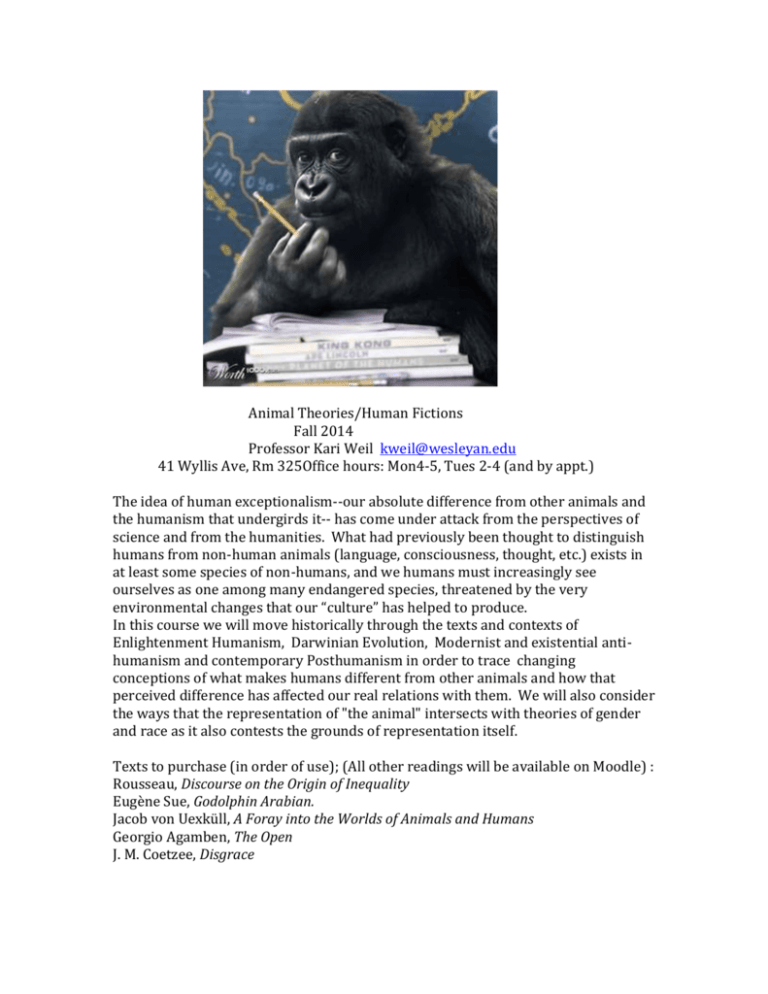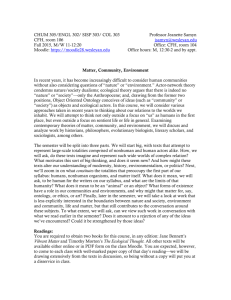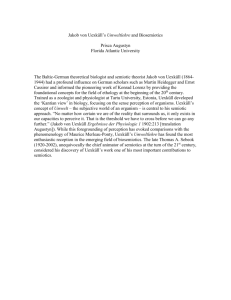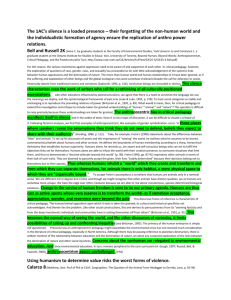Animal Theories/Human Fictions - WesFiles
advertisement

Animal Theories/Human Fictions Fall 2014 Professor Kari Weil kweil@wesleyan.edu 41 Wyllis Ave, Rm 325Office hours: Mon4-5, Tues 2-4 (and by appt.) The idea of human exceptionalism--our absolute difference from other animals and the humanism that undergirds it-- has come under attack from the perspectives of science and from the humanities. What had previously been thought to distinguish humans from non-human animals (language, consciousness, thought, etc.) exists in at least some species of non-humans, and we humans must increasingly see ourselves as one among many endangered species, threatened by the very environmental changes that our “culture” has helped to produce. In this course we will move historically through the texts and contexts of Enlightenment Humanism, Darwinian Evolution, Modernist and existential antihumanism and contemporary Posthumanism in order to trace changing conceptions of what makes humans different from other animals and how that perceived difference has affected our real relations with them. We will also consider the ways that the representation of "the animal" intersects with theories of gender and race as it also contests the grounds of representation itself. Texts to purchase (in order of use); (All other readings will be available on Moodle) : Rousseau, Discourse on the Origin of Inequality Eugène Sue, Godolphin Arabian. Jacob von Uexküll, A Foray into the Worlds of Animals and Humans Georgio Agamben, The Open J. M. Coetzee, Disgrace Class Requirements Computers should only be open to class readings, otherwise please close them. Attendance: Mandatory, as this is a seminar and we all intend to learn from each other. You have two free absences after the end of drop/add: after that, your grade will be adjusted to reflect any unexcused absence. Please let me know as soon as you are aware you will need to be absent. Papers: There will be three short papers (3 pages) and one longer paper/project.(8-10 pages). Papers should be turned in on time (see syllabus). One late paper is allowed but will not be accepted if more than one week late. The final paper/project will be on a topic of your choice and should include your own independent research. These may also be collaborative. Students should come to discuss this final project with me. All papers should follow either the MLA or Chicago Manuel of Style. Presentations: With one or two partners, students will t give a 5-10 minute presentation on or around an assigned text. You may discuss one or more passages or ideas of the text; or you may want to investigate the cultural/historical contexts that inform the text(s) assigned for that day. Feel free to come and discuss your ideas/questions with me beforehand. Discussion board. Every other week students will be asked to select one or two quotations or passages from the reading for discussion. Students should post the quotation on the discussion board, giving the page number and context for the quotation. You may select quotations from two different texts that, in your mind, are interesting to consider together or select a single quotation that you want to think about further. If the quotation is from a literary text, you should describe at what point it appears in the plot, who is speaking, to whom, or what is being described. For other texts, you should indicate where in the argument the quote appears and how it serves (or perhaps contradicts) the overall argument of the text. You should try to paraphrase the quote in your own words and then raise questions about its importance or its power, paying particular attention to its meaning, its word choice, its originality or its relation to the ideas raised in other texts. Grading: Papers 1-3: 30%; Final Paper 30% Discussion Board: 25% Presentation 15% Students with Disabilities: It is the policy of Wesleyan University to provide reasonable accommodations to students with documented disabilities. Students, however, are responsible for registering with Disabilities Services, in addition to making requests known to me in a timely manner. If you require accommodations in this class, please make an appointment with me as soon as possible [during the 3rd week of the semester], so that appropriate arrangements can be made. The procedures for registering with Disabilities Services can be found at: http://www.wesleyan.edu/studentaffairs/disabilities Syllabus Why Animal Studies? 9/1Introduction: Animals in Western Thought 9/3 11Rousseau, “On the Origins of Inequality” Part I (1754) Enlightenment Humanism and its Discontents 9/8Rousseau, Part II and notes 9/10 Account of a Savage Girl Julia Douthwaite, The Wild Girl, Natural Man, and the Monster (chap 1) 9/15 Diderot, “D’Alembert’s Dream” (1769) Part I-II (Conversation and Dream) Timothy Morton, “Queer Ecology” 9/17 Diderot, “Dream” Part III; Suggested Reading: Robert Young, “Hybridity and Fertility” from Colonial Desire.: Hybridity in Theory, Culture, Race: pp. 6-18. Guest visit: Dean Andrew Curran 1st Paper due, Friday, 9/21 Animal Orientalism : Gender/Race/Species 9/22 from Black Venus, “Writing Sex, Writing Difference,”; “Invention of the Savage;” 9/24 Balzac, “A Passion in the Desert” 9/30 Eugène Sue, Godolphin Arabian. Breeding Bodies or Morals?: Evolution,Degeneration and Progress 10/1 Jeremy Bentham, “A Utilitarian View” (1789 (excerpt), Victor Hugo, “Melancholia,” Kete, “Animal Protection in the 19th Century” 10/6Darwin— Darwin, Origin of Species (1859):, chap. 3, “Struggle for Existence” Descent of Man,(1871), Conclusions; Expression of Emotions in Man and Animals (1872), Chapters 13-14: 10/8 E.O. Wilson, http: “Evolution-and-our-inner-conflict” Maupassant, “Coco” Ritvo, The Animal Estate Chapter 3, “A Measure of Compassion 10/13 Nietzsche, Use and Abuse of History, (1873) Geneology of Morals (1887) (excerpts)“Oh my Animals,” (excerpts 1881-1887); Ritvo, “Prize Pets. Desiring Subjects and Abject Objects of Modernism 10/15 Thomas Mann, “Tobias Mindernickel,” (1898); Mary Douglas, “External Boundaries,” Julia Kristeva, Powers of Horror, 1-19, Elizabeth Bishop, “Pink Dog,” 2nd Paper due, Friday, 10/17 FALL BREAK 10/22 Alice Kuzniar, “On Shame” Melancholia’s Dog Kafka, “Investigations of a Dog” (1922), “ Report to an Academy” 10/27 Ackerley, My Dog Tulip Animal Phenomenology 10/29 Uexküll, “A Foray into the Worlds of Animals and Humans” (1934), and Introduction by Dorion Sagan. 1-92. 11/3 Uexkülll, cont. , 92-135. Rainer Maria Rilke, “The Eighth Elegy,”(1922), 11/5 Martin Heidegger, The Fundamental Concepts of Metaphysics, (1938) Sections: 42, 46-48, 59(b) 11/10 Georgio Agamben, The Open, (2004), 1-47. 11/12 Agamben, cont. , 49-end. 3rd Paper due, Friday 11/16 Posthumanist animals 11/17 Emmanuel Levinas, “The Name of a Dog” (1990); Vicki Hearne, “Job’s Animals” (1994) Hélène Cixous, “Stigmata, Or Job the Dog”(1998) 11/19 Derrida, “The Animal that Therefore I am” 11/24 Deleuze and Guattari, “Becoming Animal” (1980), Donna Haraway, When Species Meet (2008) selections Thanksgiving 12/1 J.M. Coetzee Disgrace 12/3 Wolfe, “Introduction,” What is Post-humanism?;” Vincianne Despret,, “The Body we Care For,” Final Paper Due Thursday, December 10











